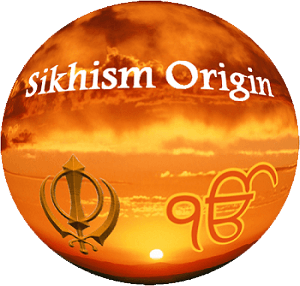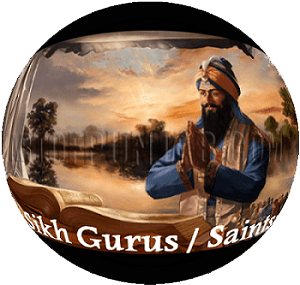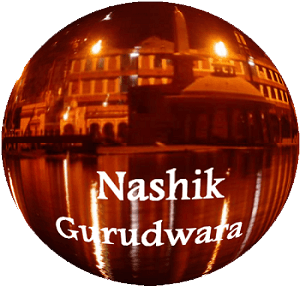- Sikh Saints -
The Panj Piaras (The Five Beloved Ones)
The Panj Piaras were the first five Sikhs to be initiated into the Khalsa brotherhood by Guru Gobind Singh on Baisakhi day in 1699. A very large gathering of Sikhs had arrived at Anandpur Sahib on that day as per the Gurus instructions. After prayers Guru Gobind Singh stood up with his sword and asked the large congregation, "Is there anyone here ready to lay down his life at my call? This sword of mine is crying for the blood of a dear Sikh of mine." The congregation was shocked and afraid, the third time Guru Gobind Singh repeated his call, Daya Ram stood up and offered his head. Guru Gobind Singh took him into a tent. The sound of a sword cutting a body was heard and blood trickled out of the tent. Guru Gobind Singh emerged from the tent and asked for another Sikh. Dharam Das stood up and volunteered. Again the same episode was repeated. Three more Sikhs offered their heads to the Guru in the same way, Mukham Chand, Himmat Rai and Sahib Chand. After some time Guru Gobind Singh brought the five Sikhs before the congregation dressed in new clothes. Guru Gobind Singh then baptized them with amrit (sweetened water) stirred with his Khanda, The Guru called them his Beloved Ones and gave them the last name 'Singh' which means Lion. Guru Gobind Singh then humbly bowed before the Five Beloved Ones and asked them to initiate Him into the Khalsa Brotherhood. All of the Five Beloved Ones remained with Guru Gobind Singh for the rest of their lives and they are remembered every day in Ardas (the common prayer).
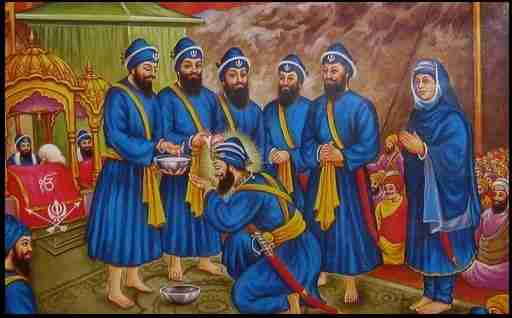
1. Bhai Daya Singh (1669 to 1708)
The first Beloved One, Bhai Daya Singh was born to Khatri parents in Lahore in 1669. He attended Guru Gobind Singh in leaving Chamkaur Sahib during the famous battle in 1704. Bhai Daya Singh also personally delivered Guru Gobind Singhs letter Zafarnama to emperor Aurangzeb in the Deccan. Bhai Daya Singh accompanied Guru Gobind Singh to Nander and died there in 1708.
2. Bhai Dharam Singh (1666 to 1708?)
The second Beloved One, Bhai Dharam Singh was born to Jat parents at Hastinapur or Delhi in 1666. Bhai Dharam Singh was also assigned to look after Guru Gobind Singhs personal safety during the battle of Chamkaur in 1704. It is unclear whether he died fighting in the battle or accompanied Guru Gobind Singh to Nanader and died there in 1708.
3. Bhai Mukham Singh (1663 to 1704)
The third Beloved One, Bhai Muhkam Chand was born in 1663 to a washerman of Dwarka. He died fighting in the battle of Chamkaur in 1704.
4. Bhai Sahib Singh (1662 to 1704)
The fourth Beloved One, Bhai Sahib Singh was born to a barber family in 1662. He died fighting in the battle of Chamkaur in 1704.
5. Bhai Himmat Singh (1661 to 1704)
The fifth Beloved One, Bhai Himmat Singh was born to a water carrier in 1661. He died fighting in the battle of Chamkaur in 1704.
Banda Singh Bahadur (1670 to 1715)
The great Sikh soldier and martyr who avenged the death of Guru Gobind Singhs two younger sons. He was born as Lachhman Das in 1670 at Rajouri in Jammu to Rajput parents. He spent many years in hindu monasteries in central India and established a ashram at Nanded in Maharashtra where he lived for fifteen years before meeting Guru Gobind Singh. He was given the name "Banda" meaning slave of the Guru and became a Khalsa. His name was changed to Gurbax Singh but he was popularly known as Banda.
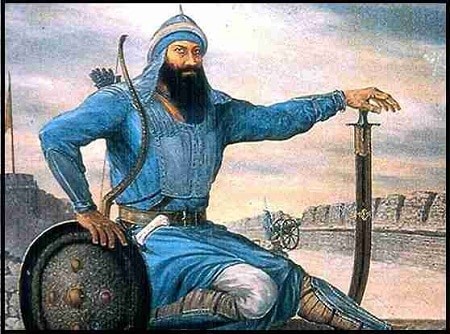
When Guru Gobind Singh was in the south at Deccan he sent Banda to Punjab to punish the enemies of the Khalsa. He attacked Samana in 1709 and captured Sirhind in 1710. The killer of Guru Gobind Singh's two sons Wazir Khan the ruler of Sirhind was also killed. Banda Singh Bahadur became the leader of the Khalsa following the death of Guru Gobind Singh and struck coins in the name of Guru Gobind Singh. In 1712 Banda conquered the Lohgarh Fort. A huge army of 20,000 men amassed by the muslim governor of Lahore besieged Banda for eight months at a fort in Gurdaspur in 1715. Banda Singh Bahadur along with 600 Sikhs were finally captured and brought to Delhi where they were all tortured to death for refusing to convert to Islam.
Baba Deep Singh (1680? to 1762)
Baba Deep Singh was a great Sikh scholar who became a soldier and martyr for the defense of Sikhism. Not much is know about his early life but when he visited Anandpur Sahib in 1700, he became a Khalsa and decided to stay. There he learned Gurmukhi from Bhai Mani Singh along with horse riding, archery as well as other arms training. Baba Deep Singh met Guru Gobind Singh at Damdama Sahib where Guru Gobind Singh told him to start preaching the message of Sikhism.
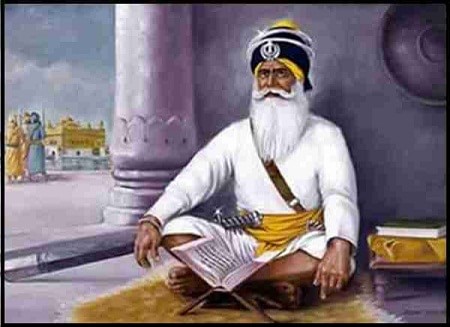
Between 1715 and 1728 Baba Deep Singh and Bhai Mani Singh produced a number of hand written copies of the Guru Granth Sahib for distribution among the Sikhs. When Bhai Mani Singh became the head granthi at the Golden Temple, Baba Deep Singh stayed on as the head at Damdama Sahib. In 1710 Baba Deep Singh joined Banda Singh Bahadur in the battle of Sirhind. Baba Deep Singh was also a survivor of the Chotta Ghalughara (Small Holocaust) in 1755 when 10,000 Sikhs were killed. In 1762 Ahmed Shah Abdhali the Afghan invader ordered the Golden Temple blown up and the sacred pool filled in with refuse. Baba Deep Singh came out of scholarly retirement at Damdama Sahib and asked Sikhs to march with him to Amritsar to avenge the desecration. Along the way to Amritsar 5,000 Sikhs joined Baba Deep Singh. On the outskirts of Amritsar Baba Deep Singh and the heavily outnumbered Sikhs fought two fierce battles against a mughal force of 20,000. In the second engagement Baba Deep Singh was fatally wounded in the neck but had vowed to die in the precincts of the Golden Temple. Although mortally wounded Baba Deep Singh was able to continue fighting until he was able to make his way to the Sacred Pool of the Golden Temple where he finally expired.
The Sahibzadas
These were the four sons of Guru Gobind Singh who bravely sacrificed their lives for Sikhism and are remembered every day in Ardas (the common prayer).
1. Baba Ajit Singh and Baba Jujhar Singh
Baba Ajit Singh was the oldest son of Guru Gobind Singh and was born on January 7, 1687 at Anandpur Sahib. Baba Jujhar Singh the Gurus second son was born in March 1689. Both brothers received religious education as well as training in the weapons of war. During the battle of Chamkaur in 1704 in which the Guru and 40 Sikhs fought against overwhelming odds, both brothers died in battle. During the battle Baba Ajit Singh asked his fathers permission to go out of the fort and fight the enemy. He said, "Dear father, my name is Ajit or Unconquerable. I will not be conquered. And if conquered, I will not flee or come back alive. Permit me to go, dear father." Guru Gobind Singh hugged and kissed his beloved son before sending him into battle where he fought heroically until his last breath. Baba Jujhar Singh having watched his brother fight, asked Guru Gobind Singh, "Permit me, dear father to go where my brother has gone. Don't say that I am too young. I am your son, I am a Singh or Lion of yours. I shall prove worthy of you. I shall die fighting, with my face towards the enemy, with God and the Guru on my lips and in my heart."
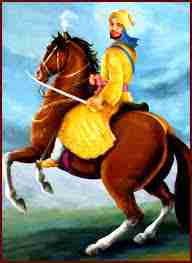
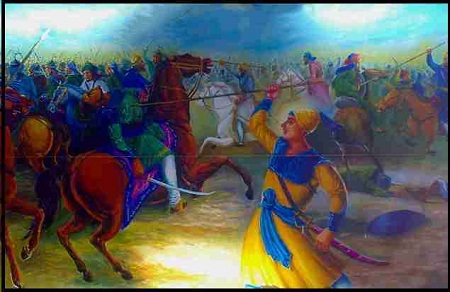
Guru Gobind Singh embraced him and said, "Go my son and wed life-giving Death. We have been here for a while. Now we shall return to our real home. Go and wait for me there. Your grandfather and elder brother are already waiting for you." Thus the Guru watched his two sons achieve eternal peace through martyrdom.
2. Baba Zorawar Singh and Baba Fateh Singh
The two youngest sons of Guru Gobind Singh, Baba Zorawar Singh was the third son and was born in 1696 while Baba Fateh Singh was the youngest son and was born in 1698. During the crossing of the river Sarsa following the departure of the Guru and his family from Anandpur Sahib, the Sikhs were attacked by the treacherous mughals who had guaranteed them safe passage. During the ensuing battle and confusion, both sons along with Mata Gujri, Guru Gobind Singhs mother, were separated from the others. Eventually through the treachery of a Brahmin named Gangu they fell into the hands of Nawab Wazir Khan the governor of Sirhind.
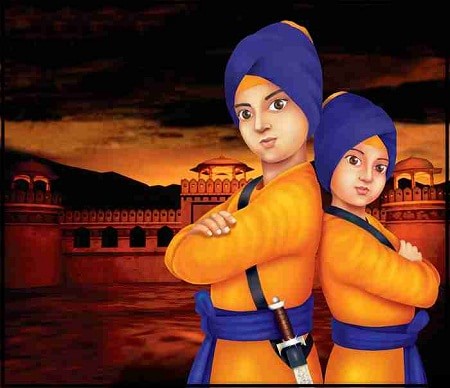
The Nawab gave the two young brothers a choice of either converting to Islam or being put to death. Baba Zorawar Singh said to his little brother, "My brother, the time to sacrifice our lives has arrived. What do you think? What should be our reply?" Baba Fateh Singh his younger brother replied, "Brother dear, our grandfather, Guru Tegh Bahadur parted with his head; he stoutly refused to part with his religion. We should follow his example. We have received the baptism of the spirit and the sword. We are the Guru's lions. Why should we fear death? It is best that we should give up our lives for the sake of our religion. I am prepared to die". Baba Zorawar Singh replied, "That is good, indeed. The blood of Guru Arjan, Guru Hargobind, Guru Tegh Bahadur and Guru Gobind Singh runs in our veins. We are their descendants. We cannot do anything unworthy of our family". Both sons were bricked up in a wall and had their heads cut off but they steadfastly refused to convert to Islam.

